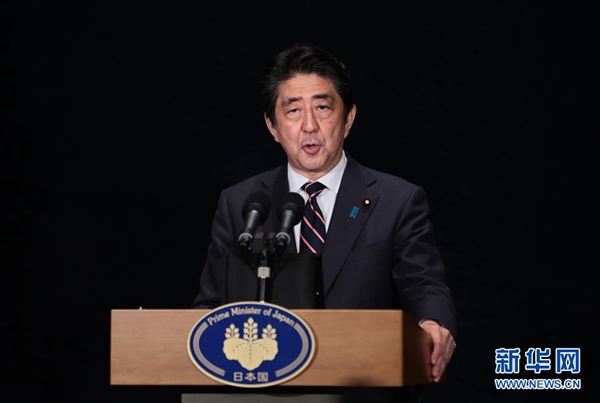Abe should be careful before seeking any constitutional change
- By Sumantra Maitra
 0 Comment(s)
0 Comment(s) Print
Print E-mail China.org.cn, October 30, 2017
E-mail China.org.cn, October 30, 2017
 |
|
Japanese Prime Minister Shinzo Abe [Xinhua] |
Prime Minister Shinzo Abe's gamble in calling a snap election paid off, as he appears on track for a super parliamentary majority.
Calculations suggest his Liberal Democratic Party and allies are on their way to a two-thirds lower house majority. In a sudden election marred by heavy rain, Japanese people flocked to the polling booths, and voted overwhelmingly for Abe.
The election was almost a year ahead of schedule, but, at a time of extreme geopolitical uncertainty, Abe projected himself as a force for stability. He also created an image as a counterforce against regional threats and perceived revanchist tendencies in countries neighboring Japan.
This is an important point in Asian history. Abe's win is definitely something other countries have to take into account and act accordingly.
There were three things he promised before he won his first election. First was a return to economic growth. That didn’t happen and the results of the so-called Abenomics are debatable. The second was law and order. Japan doesn’t have much crime anyway. The third was the most ambitious of all – a change of Japan’s pacifist constitution.
Abe wants this to be his legacy. Japan passed a security law in 2015 that remains controversial even at home, allowing its forces to engage in what is called "collective self-defense," or, in this scenario, participating in wars in foreign countries.
Abe has made it clear that new times need new thinking, and to alter the constitution is the only way to realistically deter the threat he sees from a rising China, a nuclear North Korea, and also international terrorism.
Amending the constitution, this requires the support of two-thirds of both houses of the Diet (parliament). This still seems unlikely despite Abe's win, although victory could mean him running for another term eventually.
However, there are a few considerations to keep in mind. Firstly, American analysts are divided on the issue of any Japanese rise. On one hand, there is a section which wants to pass the local security burden onto Japan, in order to balance China. On the other hand, there’s a certain section, naturally skeptical of Japanese militarization. The Americans also understand that will automatically make other regional countries nervous, defensive or even aggressive.
Americans don't really want that complication. Moreover, the idea that Japan is threatened by terrorism, especially of the Islamic variety, is laughable. As American policy makers lately have mentioned, the fact that allies will consistently remain weak and the U.S. will have to continue to provide support is an idea entrenched in American grand strategy.
It is therefore curious that Abe now wants to modernize the Japanese martial tradition. American policy makers are in a dilemma. On one hand, the argument is to allow Japan to militarize and provide a regional counterbalance but on the other hand, the cost of Japanese militarization in terms of heightened regional tension is something that might prove unbearable in the long run.
That said, Abe could solidify his legacy, by achieving détente with China. After all, China and Japan share similar goals in regard to the denuclearization of the Korean peninsula. They also have economic interests greater than anyone else in Asia.
Abe could use the opportunities to truly create a positive relationship and lasting legacy between the two countries. It is important to remember that Abe understands that there is no military option in North Korea. Immediately after winning, he was quoted by BBC saying that, "as I promised in the election, my imminent task is to firmly deal with North Korea and, for that, strong diplomacy is required."
That is hopeful. Abe knows that any aggressive change to the Japanese constitution not only would greatly divide Japan, but antagonize others in the region. Anyway, it’s not likely to happen. Any change would need a referendum, and the public is utterly divided; any loss would be a blot on Abe’s legacy. Let’s hope prudence will prevail.
Sumantra Maitra is a columnist with China.org.cn. For more information please visit:
http://m.formacion-profesional-a-distancia.com/opinion/SumantraMaitra.htm
Opinion articles reflect the views of their authors only, not necessarily those of China.org.cn.





